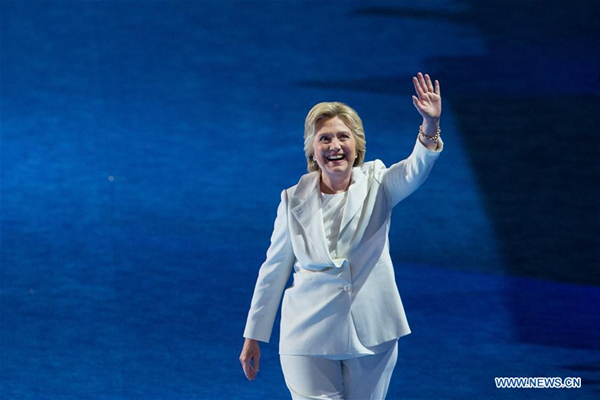Hillary Clinton's litany of excuses
- By Kyle Burnaby
 0 Comment(s)
0 Comment(s) Print
Print E-mail China.org.cn, October 3, 2017
E-mail China.org.cn, October 3, 2017
 |
Hillary Clinton gestures to spectators on the last day of the 2016 U.S. Democratic National Convention at Wells Fargo Center, Philadelphia, Pennsylvania, the United States, on July 28, 2016. [Xinhua/Li Muzi] |
Hillary Clinton's loss to Donald Trump last year in the American presidential election came as a shock not only to her own supporters, but to many of her opponent's supporters as well. Almost all of the polls in the weeks leading up to the election predicted a victory for Clinton, with many anticipating a significant margin of victory. With each passing day, the possibility that the businessman-turned-reality TV star would come out on top seemed increasingly unlikely. Then came Nov. 8 and its improbable result. Clinton, no doubt devastated, dropped out of sight for sometime; when she did eventually begin appearing in public again, she almost always spoke about Trump and her failure to become America's first female president.
It's understandable that Clinton needed to vent after the election. But many noted her almost total incapacity to take any responsibility for her loss; there was a whole host of other issues and people to be blamed first. Even when she did acknowledge that her campaign had made mistakes, she would immediately follow with the caveat that all campaigns do so, rendering what might have been a moment of humility into another excuse. Listening to her endlessly repeat the supposed reasons she hadn't been elected soon became tiresome, even for many left-leaning Americans.
But for Clinton, these public appearances apparently weren't enough to get her point across. On Sept. 15, her book "What Happened" was published, which, as the title suggests, details why she believes she lost to Trump. Clearly, she has a lot to say on the topic and was eager to have it said: the book's 500-plus pages were written in the ten short months since the election. Clinton has appeared on talk shows, podcasts, and elsewhere to promote her book, meaning that even if you don't read "What Happened," you still might not be able to avoid hearing Clinton talk about it.
One has to wonder if this book's existence is really necessary and if it can possibly do any good for either Clinton or the Democratic Party. Certainly, there will be strong Clinton supporters who read the book, agree with many of its now-familiar arguments, and finish it with the satisfaction of having their preexisting opinions reinforced. But these people are already staunch Democrats -- no one's being converted. On the other hand, there will be strong Trump supporters who read the book, denounce everything it has to say as a lie, and come away from it disliking Clinton even more than before. The third major group will be moderates, the people who are actually open to changing their mind, but it's hard to imagine how reading a 500-page excuse for losing will bring them further to the left. If anything, they'll likely find Clinton's victim mentality to be off-putting and may wonder if a different attitude would better suit someone who just ten months ago was the face of the Democratic Party.
Clinton's excuses for losing are predictable: The biggest offenders are James Comey, Bernie Sanders, sexism, and the release of the DNC emails by Wikileaks. James Comey (specifically his letter to Congress on Oct. 28, just before the election) and sexism may be the fairest reasons she lists. Blaming Wikileaks (which Clinton has propagandistically called "Russian Wikileaks") is also reasonable, though its influence on the election is debatable. And pointing the finger at Bernie Sanders is ridiculous and contemptible, especially considering that the DNC swayed the Democratic primary in Clinton's favor.
But none of these things really matter in the end. Any candidate who loses an election can point to reasons they failed -- had Trump lost, he could have easily compiled a litany of grievances and written his own book. There was the "hot mic incident" shortly before the election; the women accusing him of sexual harassment; the many Republicans who openly voiced their disgust with him. (Compare that with Clinton's accusation that Sanders didn't support her enough.) Events such as these -- and everything that Clinton says led to her loss -- are natural for an election. While important, they are not the only factors voters consider on election day. Bearing this in mind, it's hard not to view "What Happened" as cut-and-dried refusal on Clinton's part to accept her own shortcomings and failures.
During the week "What Happened" was published, Bernie Sanders was hard at work putting together a bill to reform the American healthcare system. While Sanders is looking to the future, Clinton is stuck in the past. We may now know "what happened," but perhaps we should instead be asking who was the better candidate in 2016 after all.
Opinion articles reflect the views of their authors, not necessarily those of China.org.cn






Go to Forum >>0 Comment(s)